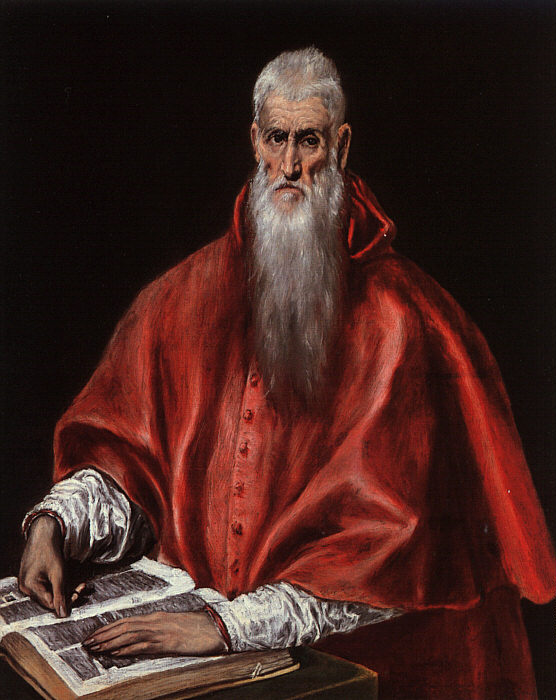SAINT JEROME, DOCTOR OF THE CHURCH [ 342-420]
Memoria: 30 September

JEROME (EUSIBIUS HIERONYMUS SOPHRONIUS), the father of the Church most learned in the Sacred Scriptures, was born about the year 342 at Stridon, a small town upon the confines of Pannonia, Dalmatia and Italy, near Aquileia. His father took great care to have his son instructed in religion and in the first principles of letters at home and afterwards sent him to Rome. Jerome had there for tutor the famous pagan grammarian Donatus. He became master of the Latin and Greek tongues (his native language was Illyrian), read the best writers in both languages with great application, and made progress in oratory; but being left without a guide under the discipline of a heathen master he forgot some of the piety which had been instilled into him in his childhood. Jerome went out of this school free indeed from gross vices, but a stranger to a Christian spirit and enslaved to vanity and other weaknesses, as he afterward confessed and bitterly lamented. On the other hand he was baptized there. After some three years in Rome he determined to travel in order to improve his studies and, with his friend Bonosus, he went to Trier. Here it was that the religious spirit with which he was so deeply imbued was awakened, and his heart was entirely converted to God.

In 370 Jerome settled down for a time at Aquileia, where the bishop, St. Valerian, had attracted so many good men that its clergy were famous all over the Western church. With many of these St. Jerome became friendly, and their names appear in his writings.
Already he was beginning to provoke strong opposition, and after two or three years an unspecified conflict broke up the group. Jerome decided to withdraw into some distant country. Bonosus, who had been the companion of his studies and his travels from childhood, went to live on a desert island in the Adriatic. Jerome himself happened to meet a well-known priest of Antioch, Evagrius, at Aquileia, which turned his mind towards the East. With his friends Innocent, Heliodorus and Hylas (a freed slave of St. Melania) he determined to go thither.
St. Jerome arrived in Antioch in 374 and made some stay there. Innocent and Hylas were struck down by illness and died, and Jerome too sickened. In a letter to St. Eustochium he relates that in the heat of fever he fell into a delirium in which he seemed to himself to be arraigned before the judgment-seat of Christ. Being asked who he was, he answered that he was a Christian. “Thou liest”, was the reply, “Thou art a Ciceronian: for where thy treasure is, there is thy heart also.” This experience had a deep effect on him which was deepened by his meeting with St. Malchus. As a result, St. Jerome withdrew into the wilderness of Chalcis, a barren land to the south-east of Antioch, where he spent four years alone. He suffered much from ill health, and even more from strong temptations of the flesh.

The church of Antioch was at this time disturbed by doctrinal and disciplinary disputes. The monks of the desert of Chalcis vehemently took sides in these disputes and wanted St. Jerome to do the same and to pronounce on the matters of issue. He preferred to stand aloof and be left to himself, but he wrote to Damasus, who had been raised to the papal chair in 366. However, not receiving a speedy answer he sent another letter on the same subject. The answer of Damasus is not extant; but it is certain that he and the West acknowledged Paulinus as bishop of Antioch, and St. Jerome received from his hands the order of priesthood when he finally left the desert of Chalcis. Jerome had no wish to be ordained (he never celebrated the eucharist) and he only consented on the condition that he should not be obliged to serve that or any other church by his ministry: his vocation was to be a monk or recluse. Soon after he want to Constantinople to study the Scriptures under St. Gregory Nazianzen. Upon St. Gregory’s leaving Constantinople in 382, St. Jerome went to Rome with Paulinus of Antioch and St. Epiphanius to attend a council which Damasus held about the schism at Antioch. When the council was over, Pope Damasus detained him and employed him as his secretary; Jerome, indeed, claimed that he spoke through the mouth of Damasus.
Side by side with this official activity he was engaged in fostering and directing the marvelous flowering of asceticism which was taking place among some of the noble ladies of Rome. But when St. Damasus died in 384, and his protection was consequently withdrawn from his secretary, St. Jerome found himself in a very difficult position. In the preceding two years, while impressing all Rome by his personal holiness, learning and honesty, he had also contrived to get himself widely disliked; on the one hand by pagans whom he had fiercely condemned and on the other by people who were offended by the saint’s harsh outspokenness and sarcastic wit. It cannot be a matter of surprise that, however justified his indignation was, his manner of expressing it aroused resentment. His own reputation was attacked with similar vigor; even his simplicity, his walk and smile, the expression of his countenance were found fault with. Neither did the severe virtue of the ladies that were under his direction nor the reservedness of his own behavior protect him from calumny: scandalous gossip was circulated about his relations with St. Paula. He was properly indignant and decided to return to the East, there to seek a quiet retreat. He embarked at Porto in August 385.

At Antioch nine months later he was joined by Paula, Eustochium and the other Roman religious women who had resolved to exile themselves with him in the Holy Land. Soon after arriving at Jerusalem they went to Egypt, to consult with the monks of Nitria, as well as with Didymus, a famous blind teacher in the school of Alexandria. With the help of Paula’s generosity a monastery for men was built near the basilica of the Nativity at Betlehem, together with buildings for three communities of women. St. Jerome himself lived and worked in a large rock-hewn cell near to our Savior’s birthplace, and opened a free school, as well as a hospice.
Here at last were some years of peace. But Jerome could not stand aside and be mute when Christian truth was threatened. At Rome he had composed his book against Helvidius on the perpetual virginity of the Blessed Virgin Mary, Helvidius having maintained that Mary had other children, by St. Joseph, after the birth of Christ. This and certain associated errors were again put forward by one Jovinian. St. Paula’s son-in-law, St. Pammachius, and other laymen were scandalized at his new doctrines, and sent his writings to St. Jerome who in 393 wrote two books against Jovinian. In the first he shows the excellence of virginity embraced for the sake of virtue, which had been denied by Jovinian, and in the second confutes his other errors. This treatise was written in Jerome’s characteristically strong style and certain expressions in it seemed to some persons in Rome harsh and derogatory from the honor due to matrimony; St. Pammachius informed St. Jerome of the offence which he and many others took at them. Thereupon Jerome wrote his Apology to Pammachius, sometimes called his third book against Jovinian, in a tone that can hardly have given his critics satisfaction. A few years later he had to turn his attention to Vigilantius – Dormantius, sleepy, he calls him – a Gallo-Roman priest who both decried celibacy and condemned the veneration of relics, calling those who paid it idolaters and worshippers of ashes.

From 395 to 400 St. Jerome was engaged in a war against Origenism, which unhappily involved a breach of his twenty-five years friendship with Rufinus. Few writers made more use of Origen’s works and no one seemed a greater admirer of his erudition than St. Jerome; but finding in the East that some had been seduced into grievous errors by the authority of his name and some of his writings he joined St. Epiphanius in warmly opposing the spreading evil. Rufinus, who then lived in a monastery at Jerusalem, had translated many of Origen’s works into Latin and was an enthusiastic upholder of his authority.
St. Augustine was distressed by the resulting quarrel, which, however, he the more easily understood because he himself became involved in a long controversy with St. Jerome arising out of the exegesis of the second chapter of St. Paul’s epistle to the Galatians. By his first letters he had unintentionally provoked Jerome, and had to use considerable charitable tact to soothe his easily wounded susceptibilities.
Nothing has rendered the name of St. Jerome so famous as his critical labors on the Holy Scriptures. While in Rome under Pope St. Damasus he had revised the gospels and the psalms in the Old Latin version followed by the rest of the New Testament. His new translation from the Hebrew of most of the books of the Old Testament was the work of his years of retreat at Bethlehem, which he undertook at the earnest entreaties of many devout and illustrious friends, and in view of the preference of the original to any version however venerable. He did not translate the books in order, but began by the books of Kings, and took the rest in hand at different times. The psalms he revised again, with the aid of Origen’s Hexapla and the Hebrew text.
In the year 404 a great blow fell on St. Jerome in the death of St. Paula and a few years later in the sacking of Rome by Alaric; many refugees fled into the East. Again towards the end of his life he was obliged to interrupt his studies by an incursion of barbarians, and some time after by the violence and persecution of the Pelagians who sent a troop of ruffians to Betlehem to assault the monks and nuns who lived there under the direction of St. Jerome, who had opposed them. Some were beaten, and a deacon was killed, and they set fire to the monasteries. In the following year St. Eustochium died and Jerome himself soon followed her: worn out with penance and work his sight and voice failing, his body like a shadow, he died peacefully on September 30, 420. He was buried under the church of the Nativity close to Paula and Eustochium, but his body was removed long after and now lies somewhere in St. Mary Major’s at Rome.
Short Prayer: Heavenly Father, You endowed Saint Jerome with a deep reverence for Holy Scripture, which he loved with all his heart. Sustain us ever more with Your word and help us to find in it the source of life in Christ. Amen.
Note: The text is taken from Michael Walsh (Editor), Butler’s Lives of the Saints – New Concise Edition, North Blackburn, Victoria 3130, Australia: Burns and Oates, 1991, pages 307-310.





